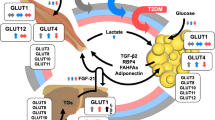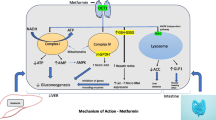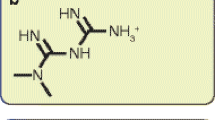Abstract.
Sulfonylureas stimulate insulin secretion independent of the blood glucose concentration. This can lead to hypoglycaemia in type 2 diabetic patients. Over the last years a number of imidazoline derivatives have been identified that stimulate insulin secretion in a more glucose-dependent way. In agreement with this, our aim was to generate imidazoline derivatives with a potential for the treatment of type 2 diabetic patients. We developed the compound 2-[4-(4-chlorophenyl)-3-(2-methoxyethoxy)-2-naphthalenyl]-4,5-dihydro-1-H-imidazole monohydrochloride (LY389382) with an imidazoline moiety and investigated its effects on glucose-dependent insulin secretion in a β-cell line, isolated rat islets and in vivo. We could demonstrate that LY389382 induces insulin secretion in MIN6 cells and rat islets in a glucose-dependent manner (EC50=1.1 µM and 0.3 µM, respectively). Furthermore during hyperglycaemia LY389382 increased insulin secretion in a dose-dependent manner in healthy rats, whereas the compound had no effect at euglycemia in a tenfold higher dosage. After 7 days of treatment of Zucker Diabetic Fatty [ZDF/(Gmi/fa)] rats with LY389382 with a dose of 15 mg/kg twice daily the blood glucose concentration was reduced from 22.7±1.7 mM to 16.6±2.3 mM. During the same time period the glucose concentration increased from 21.7±1.7 mM to 28.9±1.3 mM in the vehicle-treated group (P<0.05). The drop of the insulin level was also inhibited by LY389382 in ZDF rats. In contrast to other well-characterised imidazolines that have been shown to induce a glucose-dependent insulin secretion only within a limited range of concentrations, LY389382 stimulates insulin secretion over a concentration range of at least two log units in a glucose-dependent manner. These data suggest that this imidazoline compound has a potential for the treatment of type 2 diabetes.
Similar content being viewed by others
Author information
Authors and Affiliations
Additional information
Electronic Publication
Rights and permissions
About this article
Cite this article
Mest, HJ., Raap, A., Schloos, J. et al. Glucose-induced insulin secretion is potentiated by a new imidazoline compound. Naunyn-Schmied Arch Pharmacol 364, 47–52 (2001). https://doi.org/10.1007/s002100100415
Received:
Accepted:
Issue Date:
DOI: https://doi.org/10.1007/s002100100415




